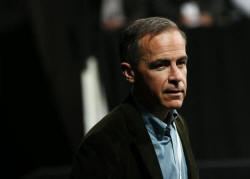|
 Bank
of England to hold steady ahead of Brexit vote Bank
of England to hold steady ahead of Brexit vote
 Send a link to a friend
Send a link to a friend
[May 09, 2016]
By William Schomberg
LONDON (Reuters) - In normal circumstances,
the Bank of England might be close to pumping more stimulus into
Britain's economy, given recent signs of a sharp slowdown in growth and
a rise in the number of people out of work.
|
|
 But Governor Mark Carney and his fellow rate-setters are all
expected to take a wait-and-see approach this week, effectively
dismissing most of the slowdown as due to temporary jitters before
Britain's historic European Union referendum on June 23. But Governor Mark Carney and his fellow rate-setters are all
expected to take a wait-and-see approach this week, effectively
dismissing most of the slowdown as due to temporary jitters before
Britain's historic European Union referendum on June 23.
A Reuters poll of economists predicted that the nine members of the
Monetary Policy Committee will maintain their united front and vote
unanimously to keep borrowing costs on hold at their record-low 0.5
percent.
Alan Clarke, an economist with Scotiabank, said the MPC had
previously held its nerve in the face of temporary influences on the
inflation outlook.
"Overall, we suspect that the committee will still vote 9-0 in favor
of unchanged Bank Rate at this meeting. However, our conviction is
not that high and the chance of at least one dissent in favor of a
rate cut has got to be approaching 50 percent," he said in an email
to clients.

The BoE has already said the lack of clarity about the referendum's
outcome has caused companies to put investment plans on hold.
However last month it said it would be less sensitive than usual to
changes in economic data around the time of the vote.
If British voters take the historic step of deciding to leave the EU,
then the BoE might try to offset the expected shock to the economy
by cutting interest rates and possibly expanding its 375
billion-pound bond-buying program.
But for now, economists expect the BoE to continue to exclude the
impact of an "Out" vote from the projections that underpin its
decisions on interest rates.
The MPC is due to publish its latest quarterly forecasts alongside
its monthly decision on rates at 1100 GMT on Thursday.
The drag from uncertainty around the referendum is likely to lead
the Bank to cut its economic growth forecasts to below Britain's
long-run average, economists said.
But key inflation forecasts are unlikely to be revised down because
of the recent fall in the value of sterling and a recovery in global
oil prices, economists said.
[to top of second column] |

Inflation was forecast in February to slightly overshoot its 2
percent target in 2-3 years' time, but despite this financial
markets do not price in a first rate rise until 2019. Most
economists expect a move next year.
Carney is expected to face more questions about the impact of a vote
to leave the EU when he holds a news conference shortly after the
Bank's policy decision and quarterly forecasts are published.
He has previously described a so-called Brexit decision as the
biggest domestic risk to Britain's financial stability and the Bank
has said the country's economy has benefited from its membership of
the EU.
Those comments have drawn criticism from campaigners who want
Britain out of the EU. Former finance minister Nigel Lawson has
accused Carney of over-stepping his remit and venturing into
politics.
"The governor will be extremely wary of being seen as wading in on
the Brexit debate," Capital Economics's Paul Hollingsworth said.
"That said, with Mr Carney likely to underline that uncertainty
about the outcome of the referendum is weighing on the economy at
present ... his comments no doubt will be interpreted as being
supportive of 'Remain'."
(Additional reporting by David Milliken; Editing by Tom Heneghan)
[© 2016 Thomson Reuters. All rights
reserved.] Copyright 2016 Reuters. All rights reserved. This material may not be published,
broadcast, rewritten or redistributed.

 |